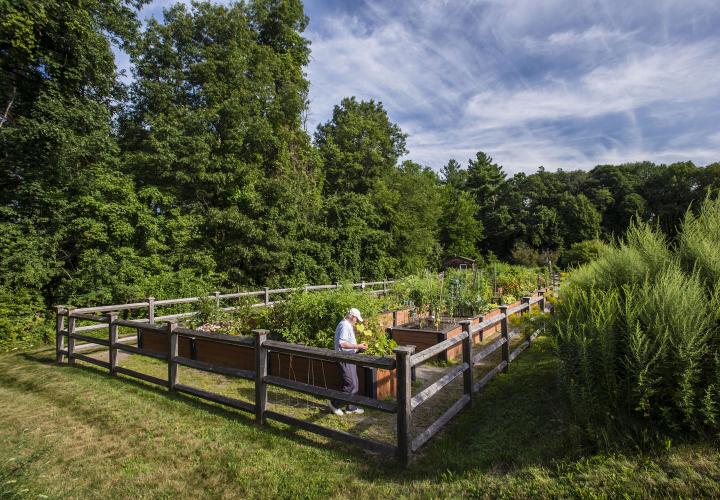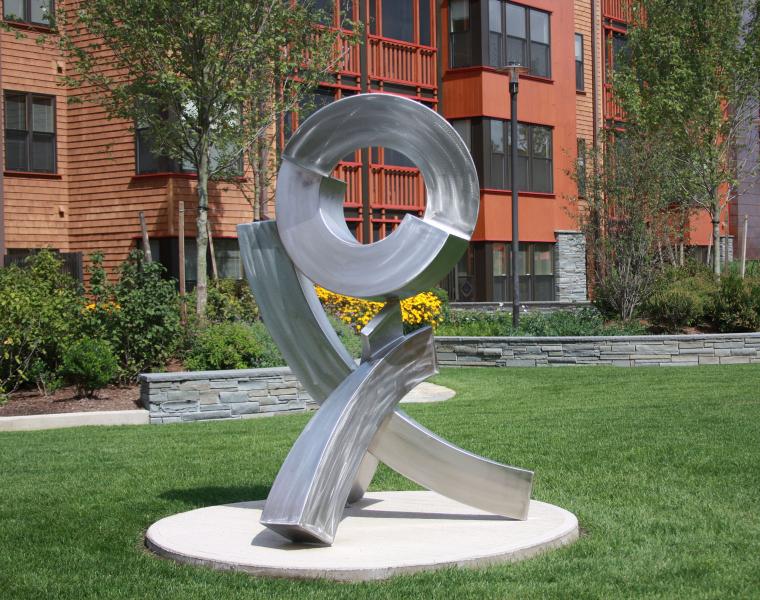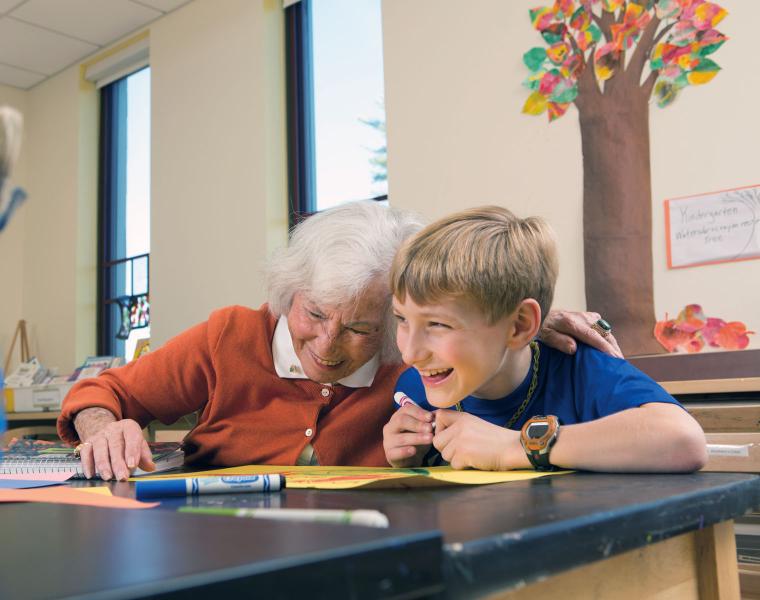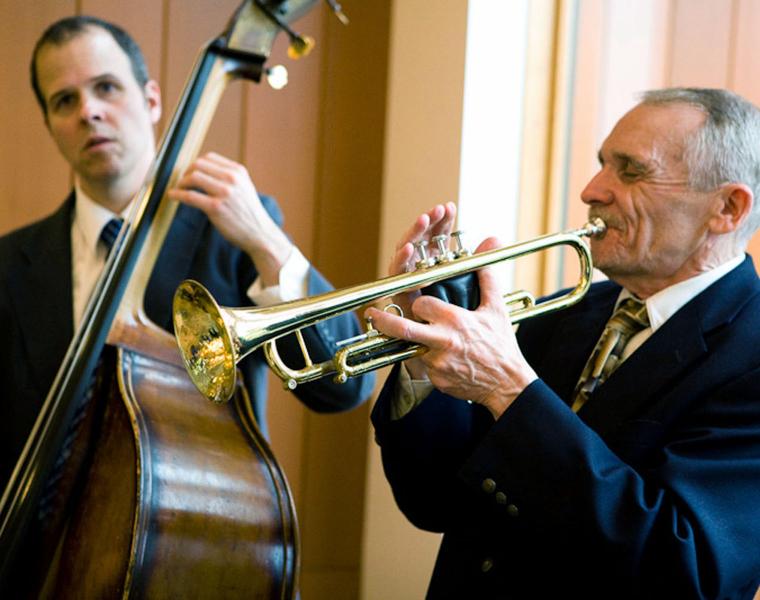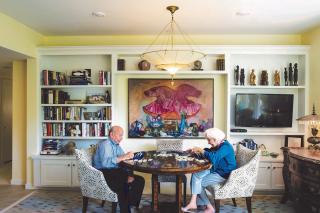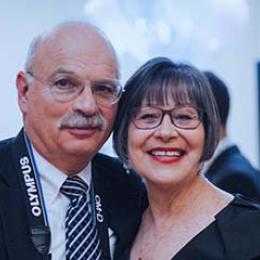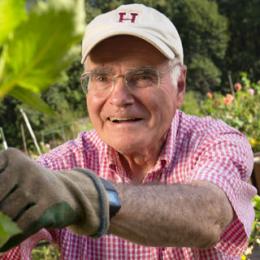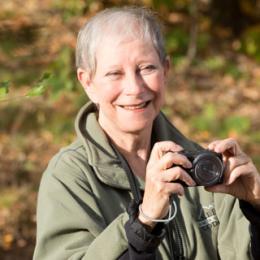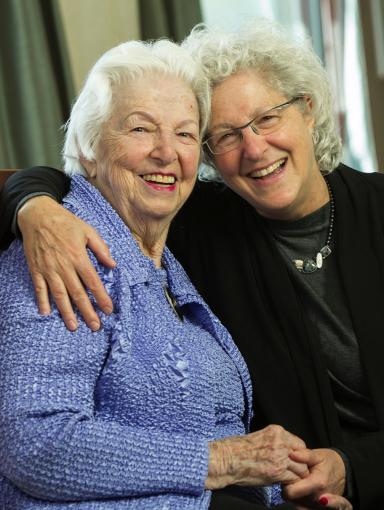Hebrew SeniorLife Blog
Tips and resources to help you navigate the joys and challenges of aging, from Boston's trusted expert in senior care.
New Apartments for Seniors Available Summer 2023 at Randolph’s Simon C. Fireman Community
With lottery phase complete, remaining apartments will be leased on a first-come, first-served basis.
The Simon C. Fireman Community is in the final stages of constructing 45 new apartments and new community spaces as an expansion of its existing property at 640 North Main Street in Randolph, MA. The apartments are projected to be move-in ready this summer, offering affordable housing with services so older adults can live their best lives.
While the first residents for many of the new apartments have already been identified through a lottery process that concluded on March 2, 2023, remaining apartments will be leased on a first-come, first-served basis at a monthly rent of $1,499 for individuals 62+ years of age who qualify financially. These apartments are also available to older adults holding mobile Section 8 vouchers.
Each one-bedroom apartment will be approximately 620 square feet and include a full kitchen, energy-efficient heat and air conditioning controls, laminate flooring, 24-hour emergency system, and bathroom handrails. Sensory and mobility accessible units will also be available.
In addition to the apartments, the expanded property will offer an additional multi-purpose room, fitness center, art/game room, deck, library and reading nooks, lounge, and two courtyards with walking paths.
Residents of the new expansion units will benefit from all the services and supports offered to current residents throughout the Simon C. Fireman Community to keep older adults healthy, active, and engaged. These include an onsite dining program, daily programming to support seniors’ quality of life and wellness, transportation to local shops, security and facilities staff available around the clock for emergencies, a grocery and goodies store, weekly banking services, and a hair salon.
Eligibility
Applicants aged 62+ earning between $43,050 - $58,920 for a single occupant, or between $43,050 - $67,320 for two people, or individuals with mobile section 8 vouchers are invited to apply.
Simon C. Fireman Community is a 100% affordable senior supportive housing community. An applicant or a member of the household must be 62 years or older to live there. As part of Hebrew SeniorLife, a Harvard Medical School-affiliated nonprofit provider of senior care, Simon C. Fireman Community welcomes seniors of any religion, culture, race, sexual orientation, gender expression, and class background.
How to Apply
Download the application here or request an application be sent to you by contacting 781-986-8880 or FiremanExpansion@hsl.harvard.edu. Once complete, you can submit your application by emailing it to FiremanExpansion@hsl.harvard.edu, faxing it to 781-922-3706, or delivering it by mail or in person to Simon C. Fireman Community, 640 North Main Street, Randolph, MA, 02368.
For More Information
For more information about the new apartments as well as Simon C. Fireman Community, please visit the Simon C. Fireman Community website.
About Hebrew SeniorLife
Hebrew SeniorLife, an affiliate of Harvard Medical School, was founded in 1903 and today is a national leader dedicated to empowering seniors to live their best lives. Hebrew SeniorLife cares for more than 3,000 seniors a day across six campuses throughout Greater Boston. Locations include: Hebrew Rehabilitation Center-Boston and Hebrew Rehabilitation Center-NewBridge in Dedham; NewBridge on the Charles, Dedham; Orchard Cove, Canton; Simon C. Fireman Community, Randolph; Center Communities of Brookline; and Jack Satter House, Revere.
New Study Finds Staff Assumptions about Race Play a Role in the Variability of Care of Nursing Homes Residents with Advanced Dementia
Remedies include addressing staff biases, increasing funding for facilities, standardizing advance-care planning, and educating staff and families about evidence-based care and shared decision making
BOSTON – A new study published today in the Journal of the American Medical Association Internal Medicine (JAMA IM) found several factors – including staff assumptions about minoritized groups – may play a role in the variability in the quality of care provided to U.S. nursing home residents with advanced dementia.
The study, “Nursing Home Organizational Culture and Staff Perspectives Influencing Variability in Advanced Dementia Care: The ADVANCE Study,” identified organizational factors and staff perceptions at nursing homes that may drive known variability in the type of care provided nursing home residents with advanced dementia, especially in the use of more aggressive interventions like tube-feeding or hospitalizations. These aggressive interventions are considered by many to be markers of poor quality of care, as they often do not promote clinical benefits or comfort among persons with advanced dementia.
Prior research has shown Black residents (versus white residents and those in facilities in the southeastern part of the United States) get more aggressive care, including greater use of feeding tubes and hospital transfers.
Ruth Palan Lopez, Ph.D., G.N.P.-B.C., F.A.A.N., Professor and Associate Dean of Research, Jacques Mohr Chair at MGH Institute of Health Professions School of Nursing, and Susan L. Mitchell, M.D., M.P.H., Senior Scientist, Hinda and Arthur Marcus Institute for Aging Research at Hebrew SeniorLife and Professor of Medicine at Harvard Medical School, are the lead authors of the study. Their research was supported by the National Institute on Aging of the National Institutes of Health Award Number R01AG058539.
“The study identified several factors that nursing homes could target to improve delivery of goal-directed care to all residents. One is to improve provider knowledge and communication skills that less aggressive interventions may be more in line with the residents’ wishes and best evidence,” said Dr. Lopez. “For example, many nurses may believe that feeding tubes prolong the life of advanced dementia patients, but this is not borne out by existing studies. Nursing homes need to make sure their staff is aware that hand feeding is better for residents. Based on prior research, aggressive interventions can be less effective compared to less-intensive interventions, like feeding residents manually, while requiring more time of the nursing staff provides better care to their patients.”
The most concerning finding was that staff in nursing homes had preconceptions that families of Black residents did not want to engage in advance care planning and preferred more aggressive care.
“Staff preconceptions that Blacks are less willing to engage in advance care planning and want more aggressive care speaks to the need to address systemic racial biases in nursing homes,” said Dr. Mitchell, noting that nursing homes in the United States tend to be racially segregated and low-resource homes tend to have more Black residents. “Achieving health equity for all nursing home residents with advanced dementia must be the driving force behind all efforts aimed at reducing disparities in their care.”
Researchers conducted 169 staff interviews at 14 nursing homes in four states. They identified factors that were typical of nursing homes that provided less intensity of care including: the quality of the physical environment (e.g., good repair, non-malodorous), the availability of standardized advance care planning, greater staff engagement in shared decision-making, and staff understanding that feeding tubes do not prolong life. Aggressive intervention was considered suboptimal.
More equitable advanced dementia care, the study concluded, may be achieved by addressing several factors, including staff biases towards Black residents. Other solutions include increasing support and funding for low-resourced facilities, standardizing advance-care planning, and educating staff, patients, and their families about evidenced-based care and goal-directed decision-making in advanced dementia.
Other researchers collaborating in this study work at Beth Israel Deaconess Medical Center, Harvard Medical School, Meyers Primary Care Institute, University of Massachusetts Medical School, Oregon Health & Science University School of Nursing, the University of Tennessee at Martin, Emory Center for Health in Aging and the Nell Hodgson Woodruff School of Nursing at Emory University, the Center for the Study of Aging and Human Development at Duke University School of Medicine, and the Geriatrics Research Education and Clinical Center at Veteran Affairs Medicine Center.
About MGH Institute of Health Professions
Team-based care, delivered by clinicians skilled in collaboration and communication, leads to better outcomes for patients. That’s why MGH Institute of Health Professions graduate school in Boston integrates interprofessional education into its academic programs. Approximately 1,600 students at its Charlestown Navy Yard campus learn and collaborate in teams across disciplines as they pursue post-baccalaureate, master’s, and doctoral degrees in genetic counseling, nursing, occupational therapy, physical therapy, physician assistant studies, speech-language pathology, health professions education, and rehabilitation sciences. The interprofessional learning model extends to hundreds of hospital, clinical, community, and educational sites in Greater Boston and beyond. The MGH Institute is the only degree-granting affiliate of Mass General Brigham, New England’s largest health provider. It has educated more than 9,000 graduates since its 1977 founding. It is fully accredited by the New England Commission of Higher Education. Several programs are highly ranked by U.S. News & World Report.
About Hebrew SeniorLife
Hebrew SeniorLife, an affiliate of Harvard Medical School, is a national senior services leader uniquely dedicated to rethinking, researching, and redefining the possibilities of aging. Hebrew SeniorLife cares for more than 3,000 seniors a day across six campuses throughout Greater Boston. Locations include: Hebrew Rehabilitation Center-Boston and Hebrew Rehabilitation Center-NewBridge in Dedham; NewBridge on the Charles, Dedham; Orchard Cove, Canton; Simon C. Fireman Community, Randolph; Center Communities of Brookline, Brookline; and Jack Satter House, Revere. Founded in 1903, Hebrew SeniorLife also conducts influential research into aging at the Hinda and Arthur Marcus Institute for Aging Research, which has a portfolio of more than $63 million, making it the largest gerontological research facility in the U.S. in a clinical setting. It also trains more than 1,000 geriatric care providers each year. For more information about Hebrew SeniorLife, visit https://www.hebrewseniorlife.org or follow us on our blog, Facebook, Instagram, Twitter, and LinkedIn.
About the Hinda and Arthur Marcus Institute for Aging Research
Scientists at the Marcus Institute seek to transform the human experience of aging by conducting research that will ensure a life of health, dignity, and productivity into advanced age. The Marcus Institute carries out rigorous studies that discover the mechanisms of age-related disease and disability; lead to the prevention, treatment, and cure of disease; advance the standard of care for older people; and inform public decision-making.
New Study Compares Risks for Antipsychotic Drugs After Major Surgery for Older Adults
Researchers recommend implementing non-pharmacological strategies to prevent post-operative delirium.
BOSTON, MA – A new study published in the Annals of Internal Medicine that compared different antipsychotics used to treat symptoms of post-operative delirium in older patients found that the risks of commonly prescribed atypical antipsychotic drugs such as olanzapine, quetiapine, and risperidone, were not safer than haloperidol in combatting delirium.
Post-operative delirium is the most common post-operative complication in older adults, and is associated with longer hospital stays, institutional discharge, decline in function, mortality, and increased healthcare costs. Doctors have prescribed off-label use of atypical antipsychotic drugs such as olanzapine, quetiapine, and risperidone, to address delirium symptoms because they were often considered less harmful than haloperidol.
However, after examining hospital administrative data for 17,115 patients aged 65 and older without psychiatric disorders who were prescribed an oral antipsychotic drug after major surgery from 2009 to 2018, this observational study, “Comparative Safety Analysis of Oral Antipsychotics for In-Hospital Adverse Clinical Events in Older Adults After Major Surgery,” found the risk for in-hospital deaths, cardiac arrhythmia events, pneumonia, and stroke were similar across haloperidol and atypical antipsychotic drugs.
The study found no statistically significant difference in the risk for in-hospital death among patients treated with haloperidol, olanzapine, quetiapine, and risperidone. The risk for nonfatal clinical events ranged from 2.0% to 2.6% for a cardiac arrhythmia event, 4.2% to 4.6% for pneumonia, and 0.6% to 1.2% for stroke or transient ischemic attack, with no significant difference between the drugs.
“Based on a decade’s worth of data we reviewed, we’ve concluded that because there is no safer antipsychotic drug option, we should focus on implementing safe, non-pharmacological strategies to prevent postoperative delirium, and reducing off-label antipsychotic drug use altogether,” said Dae Hyun Kim, M.D., MPH, ScD, associate scientist, Hinda and Arthur Marcus Institute for Aging Research, Hebrew SeniorLife, associate professor of medicine, Harvard Medical School, and lead author of the study. “As proven by the Hospital Elder Life Program, developed by Dr. Sharon Inouye at Hebrew SeniorLife, non-pharmacological strategies, such as cognitive stimulating activities, frequent orientation, regular mobility, nutrition, hydration, and sleep hygiene, can safely reduce delirium in the hospitalized older adults.”
Brigham and Women’s Hospital, Beth Israel Deaconess Medical Center, Vanderbilt University Medical Center, Yale University, Stanford University, and Brown University collaborated in this retrospective cohort study.
Co-authors of the study include Su Been Lee, research assistant at Division of Pharmacoepidemiology and Pharmacoeconomics, Brigham and Women's Hospital; Chanmi Park, M.D., MPH, post-doctoral research fellow at the Marcus Institute; Raisa Levin, M.S., sr. programmer/analyst at Brigham and Women's Hospital; Eran Metzger, M.D., medical director of psychiatry at Hebrew SeniorLife; Brian T. Bateman, M.D., ScM, professor and chair, Department of Anesthesiology, Perioperative and Pain Medicine, Stanford University School of Medicine; E. Wesley Ely, M.D., MPH, professor of medicine and critical care, associate director of aging research, VA GRECC; Pratik P. Pandharipande, M.D., MSCI, professor of anesthesiology and surgery, Vanderbilt University Medical Center; Margaret A. Pisani, M.D., MPH, professor of internal medicine, Yale University School of Medicine; Richard N. Jones, ScD, professor, Department of Psychiatry and Human Behavior, Department of Neurology, Warren Alpert Medical School, Brown University; Edward R. Marcantonio, M.D., ScM, section chief for research, Division of General Medicine, Beth Israel Deaconess Medical Center, professor of medicine, Harvard Medical School; and Sharon K. Inouye, M.D., MPH, professor of medicine at Harvard Medical School, the Milton and Shirley F. Levy Family chair and director of the Aging Brain Center at the Hinda and Arthur Marcus Institute for Aging Research.
Funding came from grants from National Institute on Aging of the National Institutes of Health under award numbers R01AG056368 and R33AG071744.
About Hebrew SeniorLife
Hebrew SeniorLife, an affiliate of Harvard Medical School, is a national senior services leader uniquely dedicated to rethinking, researching, and redefining the possibilities of aging. Hebrew SeniorLife cares for more than 4,500 seniors a day across six campuses throughout Greater Boston. Locations include: Hebrew Rehabilitation Center-Boston and Hebrew Rehabilitation Center-NewBridge in Dedham; NewBridge on the Charles, Dedham; Orchard Cove, Canton; Simon C. Fireman Community, Randolph; Center Communities of Brookline, Brookline; and Jack Satter House, Revere. Founded in 1903, Hebrew SeniorLife also conducts influential research into aging at the Hinda and Arthur Marcus Institute for Aging Research, which has a portfolio of more than $85 million, making it one of the largest gerontological research facilities in the U.S. in a clinical setting. It also trains more than 1,000 geriatric care providers each year. For more information about Hebrew SeniorLife, visit our website or follow us on our blog, Facebook, Instagram, Twitter, and LinkedIn.
About the Hinda and Arthur Marcus Institute for Aging Research
Scientists at the Marcus Institute seek to transform the human experience of aging by conducting research that will ensure a life of health, dignity, and productivity into advanced age. The Marcus Institute carries out rigorous studies that discover the mechanisms of age-related disease and disability; lead to the prevention, treatment, and cure of disease; advance the standard of care for older people; and inform public decision-making.
New Study Shows Intensive Blood-Pressure Treatment Effective Regardless of Hypotension
Researchers’ findings have the potential to reshape clinical approaches to blood-pressure management.
A groundbreaking study published in JAMA titled “Orthostatic Hypotension, Hypertension Treatment, and Cardiovascular Disease: An Individual Participant Meta-Analysis” provides new understanding regarding the effectiveness of intensive blood-pressure treatment, offering important insights for health care providers and individuals living with hypertension (high blood pressure).
The study, led by Stephen P. Juraschek, M.D., PhD, Section for Research, Division of General Medicine, Beth Israel Deaconess Medical Center, sought to answer a pivotal question: Does the effect of intensive blood-pressure treatment on cardiovascular disease or all-cause mortality differ based on the presence or absence of orthostatic hypotension. Orthostatic hypotension, also known as postural hypotension, is an excessive drop in blood pressure when standing up from a seated or lying down position. The findings have the potential to reshape clinical approaches to blood-pressure management.
Key findings from this meta-analysis, which involved over 29,000 participants from nine hypertension trials, indicate that more intensive blood-pressure treatment is associated with a lower risk of cardiovascular disease or all-cause mortality, regardless of whether participants had orthostatic hypotension. Moreover, the study found that the effects did not significantly differ based on the presence or absence of orthostatic hypotension.
Orthostatic hypotension is defined by a significant decrease in systolic blood pressure (at least 20 mm Hg) and/or diastolic blood pressure (at least 10 mm Hg) after changing position from sitting to standing. Orthostatic hypotension may also be present if a standing systolic blood pressure is 110 mm Hg or less or a standing diastolic blood pressure is 60 mm Hg or less.
In the nine trials included in the analysis, participants were followed for a median of four years, with a mean age of 69.0 years, and 48% were women. At baseline, 9% of the participants had orthostatic hypotension.
The results showed that more intensive blood-pressure treatment lowered the risk of cardiovascular disease or all-cause mortality among those without baseline orthostatic hypotension, similarly to those with baseline orthostatic hypotension. Additionally, more intensive blood-pressure treatment lowered the risk of cardiovascular disease or all-cause mortality among those without baseline orthostatic hypotension
This study’s conclusions have significant clinical implications. According to Lewis A. Lipsitz, M.D., director, Hebrew SeniorLife Marcus Institute for Aging Research and Hebrew SeniorLife’s chief academic officer, “Asymptomatic orthostatic hypotension should not deter adults with hypertension from pursuing more intensive hypertension treatment, as long as patients are carefully monitored for hypotension while treatment is being increased. In many older adults, the slow, judicious treatment of hypertension may actually reduce the occurrence of orthostatic hypotension. The findings underscore the potential benefits and safety of intensive blood-pressure management in preventing cardiovascular disease and improving overall patient outcomes, irrespective of baseline orthostatic hypotension.”
Co-authors include:
- Jiun-Ruey Hu, M.D., MPH, clinical fellow, Yale School of Medicine
- Jennifer L. Cluett, M.D., clinical specialist in hypertension, Internal Medicine, Primary Care, Beth Israel Deaconess Medical Center
- Anthony M. Ishak, PharmD, ambulatory care clinical pharmacist, Beth Israel Deaconess Medical Center;
- Carol Mita, MLIS, research & education librarian, Harvard Medical School
- Lewis A. Lipsitz, M.D., Irving and Edyth S. Usen and Family Chair in Medical Research, Hebrew SeniorLife, professor of medicine, Harvard Medical School and chief, Division of Gerontology, Beth Israel Deaconess Medical Center
- Lawrence J. Appel, M.D., MPH, director of the Welch Center for Prevention, Epidemiology and Clinical Research, Johns Hopkins Bloomberg School of Public Health
- Nigel S. Beckett, MB ChB, consultant physician in ageing and health, Guy’s and St, Thomas’ NHS Foundation Trust, London
- Ruth L. Coleman, MSc, head of Statistics and Modelling Group, Diabetes Trials Unit, Radcliffe Department of Medicine, University of Oxford
- William C. Cushman, M.D., medical director, Department of Preventive Medicine, and professor of preventive medicine, medicine, and physiology at the University of Tennessee Health Science Center
- Barry R. Davis, M.D., PhD, professor emeritus of biostatistics & public health, Coordinating Center, University of Texas School of Public Health
- Greg Grandits, M.S., senior research fellow, Division of Biostatistics and Health Data Science, School of Public Health, University of Minnesota
- Rury R. Holman, MB ChB, emeritus professor of diabetic medicine, Diabetes Trials Unit, Radcliffe Department of Medicine, University of Oxford
- Edgar R. Miller 3rd, M.D., PhD, deputy director, Johns Hopkins Institute for Clinical and Translational Science;
- Ruth Peters, PhD, MSc, program lead for dementia, Global Brain Health Initiative, the George Institute for Global Health
- Jan A. Staessen, M.D., PhD, emeritus professor of medicine, Head Studies Coordinating Centre, Research Unit Hypertension and Cardiovascular Epidemiology, Sint-Franciscus College, Addison A. Taylor, M.D., PhD, professor of medicine-hypertension, Michael E. DeBakey VA Medical Center and Baylor College of Medicine
- Lutgarde Thijs, MSc, Studies Coordinating Centre, Research Unit Hypertension and Cardiovascular Epidemiology, Sint-Franciscuscollege, Heusden-Zolder
- Jackson T. Wright Jr, M.D., PhD, program director of the William T. Dahms M.D. Clinical Research Unit, Case Western Reserve University, University Hospitals Cleveland Medical Center
- Kenneth J. Mukamal, M.D., MPH, M.A., department associate, Beth Israel Deaconess Medical Center.
This work was supported by the National Institutes of Health/NHLBI grant K23HL135273; UK National Institute for Health Research, National Institutes of Health/National Institute on Aging grant K24AG065525.
About Hebrew SeniorLife
Hebrew SeniorLife, an affiliate of Harvard Medical School, is a national senior services leader uniquely dedicated to rethinking, researching, and redefining the possibilities of aging. Hebrew SeniorLife cares for more than 4,500 seniors a day across six campuses throughout Greater Boston. Locations include: Hebrew Rehabilitation Center-Boston and Hebrew Rehabilitation Center-NewBridge in Dedham; NewBridge on the Charles, Dedham; Orchard Cove, Canton; Simon C. Fireman Community, Randolph; Center Communities of Brookline, Brookline; and Jack Satter House, Revere. Founded in 1903, Hebrew SeniorLife also conducts influential research into aging at the Hinda and Arthur Marcus Institute for Aging Research, which has a portfolio of more than $85 million, making it one of the largest gerontological research facilities in the U.S. in a clinical setting. It also trains more than 1,000 geriatric care providers each year. For more information about Hebrew SeniorLife, visit our website or follow us on our blog, Facebook, Instagram, Twitter, and LinkedIn.
New Study Finds a Mediterranean-Style Diet May Reduce Likelihood of Frailty
Frailty occurs in 10-15% of the population but a new study, published in The American Journal of Clinical Nutrition, found that consuming a Mediterranean-style diet may prevent frailty. Changing their diet can help people prevent frailty.
BOSTON – A new study published in The American Journal of Clinical Nutrition found that consuming a Mediterranean-style diet may prevent frailty. Defined as a recognizable state of increased vulnerability resulting from a decline in function across multiple physiological systems, frailty affects 10-15% older adults, and leads to other health issues. Although the general benefits of a Mediterranean-style diet are well known, its role in the reduction of frailty in older Americans who do not normally consume such a diet was unclear.
The study titled, “Adherence to the Mediterranean-style diet and high intake of total carotenoids reduces the odds of frailty over 11 years in older adults: Results from the Framingham Offspring Study,” showed that consuming a Mediterranean-style diet, may prevent the development of frailty with aging. The study included 2,384 non-frail adults from the Framingham Offspring Study with Mediterranean-style dietary pattern score and antioxidant intakes [vitamin C, E, and total carotenoids] estimated from a food frequency questionnaire combined with frailty assessments that were conducted over ~11 years. Each unit higher score on the Mediterranean Style Dietary Pattern Score (i.e., higher adherence to a Mediterranean-style diet) reduced the odds of frailty by 3%.
The study also determined whether specific antioxidants (carotenoids, vitamins E, and C) found in a Mediterranean-style diet are related with frailty. Higher intake of carotenoids (an antioxidant commonly found in brightly colored fruits and vegetables) had the strongest association with reduced likelihood of frailty development in middle-aged and older men and women from the Framingham Heart Study, reporting that each 10-mg higher total carotenoid intake reduced the odds of frailty by 16%. Vitamin E and C were not meaningfully associated with frailty prevention.
Courtney L Millar, Ph.D., Post-Doctoral Fellow, Marcus Institute of Aging Research, Hebrew SeniorLife, and Harvard Medical School, is the lead author. “People may be able to prevent frailty by following the principles of the Mediterranean-style diet,” Dr. Millar said.
The Mediterranean-style diet encourages consumptions of fruits and vegetables.
“Increasing the intake of brightly colored fruits and vegetables that are rich in carotenoids as well as other bioactive compounds may ultimately affect the health of older adults,” said Dr. Shivani Sahni, the senior author.
The Framingham Heart Study, Boston University, and Tufts University collaborated on this observational study. This study was funded by the National Institute on Aging’s support of the Boston Claude D. Pepper Center OAIC and the Peter and Barbara Sidel Fund.
Other authors included Elise Costa, The University of North Carolina at Chapel Hill School of Medicine; Paul F Jacques, D.Sc., Senior Scientist, Nutritional Epidemiology Team and Professor, Gerald J. and Dorothy R. Friedman School of Nutrition Science and Policy at Tufts University; Alyssa B Dufour, Ph.D., Assistant Scientist II at the Hinda and Arthur Marcus Institute for Aging Research, Harvard Medical School; Douglas P Kiel, M.D., M.P.H., Director, Musculoskeletal Research Center and Senior Scientist, Hinda and Arthur Marcus Institute for Aging Research, Harvard Medical School; Marian T Hannan, D.Sc., M.P.H., Co-Director, Musculoskeletal Research Center and Senior Scientist, Hinda and Arthur Marcus Institute for Aging Research, Harvard Medical School; and Shivani Sahni, Ph.D., Director, Nutrition Program and Associate Scientist, Hinda and Arthur Marcus Institute for Aging Research, Harvard Medical School.
About Hebrew SeniorLife
Hebrew SeniorLife, an affiliate of Harvard Medical School, is a national senior services leader uniquely dedicated to rethinking, researching, and redefining the possibilities of aging. Hebrew SeniorLife cares for more than 3,000 seniors a day across six campuses throughout Greater Boston. Locations include: Hebrew Rehabilitation Center-Boston and Hebrew Rehabilitation Center-NewBridge in Dedham; NewBridge on the Charles, Dedham; Orchard Cove, Canton; Simon C. Fireman Community, Randolph; Center Communities of Brookline, Brookline; and Jack Satter House, Revere. Founded in 1903, Hebrew SeniorLife also conducts influential research into aging at the Hinda and Arthur Marcus Institute for Aging Research, which has a portfolio of more than $63 million, making it the largest gerontological research facility in the U.S. in a clinical setting. It also trains more than 1,000 geriatric care providers each year. For more information about Hebrew SeniorLife, visit our website or follow us on our blog, Facebook, Instagram, Twitter, and LinkedIn.
About the Hinda and Arthur Marcus Institute for Aging Research
Scientists at the Marcus Institute seek to transform the human experience of aging by conducting research that will ensure a life of health, dignity, and productivity into advanced age. The Marcus Institute carries out rigorous studies that discover the mechanisms of age-related disease and disability; lead to the prevention, treatment, and cure of disease; advance the standard of care for older people; and inform public decision-making.
New Study Finds Screening of Osteoporosis Lags Behind Other Diseases
New study finds bone density screenings for women over 65 years have dropped, especially for Black women; lack of post-fracture care puts patients at risk
A new perspective article published in the Lancet Diabetes & Endocrinology has highlighted that screening and treatment of osteoporosis lags behind other diseases, resulting in significant morbidity, mortality, and economic costs.
Over the past 30 years, there has been tremendous progress in the ability to diagnose osteoporosis, a disease that was once considered an inevitable consequence of aging that weakens bones and can reduce mobility, cause pain, and increase mortality. Unfortunately, despite that progress, the use of dual-energy x-ray absorptiometry (DXA) and fracture risk assessments – tests that can accurately diagnose osteoporosis and determine the likelihood of having a hip or other bone fracture, has been on the decline. According to the perspective, the use of DXA in women 65 years and older has dropped to 11.3% in 2014, down from 13.2% from five years earlier. The decline coincided with a 70% reduction in Medicare reimbursements for office-based scans.
Entitled, “Osteoporosis in the USA: prevention and unmet needs,” the review highlighted that many at-risk patients are not advised to take preventive medications, and may be unduly frightened to take them. Failures in primary prevention of osteoporosis are compounded by inadequate post-fracture follow-up care. The review noted that following a fracture, patients are not being treated with effective medications, which contrasts with the treatment of patients after a heart attack. Of patients who had an acute myocardial infarction (AMI), 96% received standard-of-care medication while only 30% of women 66 years or older received standard-of-care medication to treat osteoporosis in the 12 months after their fracture.
“Furthermore, studies have shown significantly lower screening with bone density scans and treatment in non-Hispanic Black women, with estimates of a disparity in comparison to non-Hispanic White women as high as 20%. This disparity is also present in post-fracture diagnosis and treatment,” said co-author Douglas P. Kiel, M.D., M.P.H., Director, Musculoskeletal Research Center and Senior Scientist, Hinda and Arthur Marcus Institute for Aging Research, Hebrew SeniorLife and Professor of Medicine, Harvard Medical School. “Our review underscored some myths regarding osteoporosis patients. Osteoporosis is thought to affect non-Hispanic White and Asian women, and that may be why screening, prevention and post-fracture treatment of non-Hispanic Black women is so much lower.”
According to the perspective, the reduction of Medicare reimbursement for DXA also has disenfranchised rural communities. “Understanding the impact of access to osteoporosis screening and treatment will help the country reduce disparities in care,” Dr. Kiel added. “Major holes remain in the how the U.S. serves patients with this important age-related chronic disease, and it’s clear we need to address the disparity of and access to standard-of-care.”
One other challenging factor is that currently there is no clear option for the primary prevention of osteoporosis. Estrogen had been widely used in younger post-menopausal women who had risk factors for osteoporosis but a study by the Women’s Health Initiative raised concerns about its long-term safety, which has left a gap in treatment options.
The Mayo Clinic and American Society for Bone and Mineral Research, University of Alabama collaborated in this perspective article.
Other authors included: Sundeep Khosla, M.D., head of the Osteoporosis and Bone Biology Laboratory, Mayo Clinic Kogod Center on Aging; Ann L Elderkin, P.A., Former Executive Director, American Society for Bone and Mineral Research (ASBMR); and Nicole C Wright, Ph.D., M.P.H., Assistant Professor in the Department of Epidemiology, the University of Alabama at Birmingham (UAB).
About Hebrew SeniorLife
Hebrew SeniorLife, an affiliate of Harvard Medical School, is a national senior services leader uniquely dedicated to rethinking, researching, and redefining the possibilities of aging. Hebrew SeniorLife cares for more than 3,000 seniors a day across six campuses throughout Greater Boston. Locations include: Hebrew Rehabilitation Center-Boston and Hebrew Rehabilitation Center-NewBridge in Dedham; NewBridge on the Charles, Dedham; Orchard Cove, Canton; Simon C. Fireman Community, Randolph; Center Communities of Brookline, Brookline; and Jack Satter House, Revere. Founded in 1903, Hebrew SeniorLife also conducts influential research into aging at the Hinda and Arthur Marcus Institute for Aging Research, which has a portfolio of more than $63 million, making it the largest gerontological research facility in the U.S. in a clinical setting. It also trains more than 1,000 geriatric care providers each year. For more information about Hebrew SeniorLife, visit our website or follow us on our blog, Facebook, Instagram, Twitter, and LinkedIn.
About the Hinda and Arthur Marcus Institute for Aging Research
Scientists at the Marcus Institute seek to transform the human experience of aging by conducting research that will ensure a life of health, dignity, and productivity into advanced age. The Marcus Institute carries out rigorous studies that discover the mechanisms of age-related disease and disability; lead to the prevention, treatment, and cure of disease; advance the standard of care for older people; and inform public decision-making.
New Apartment Housing Lottery Announced for Senior Housing at 108 Centre Street, Brookline
Modern, comfortable living is designed for seniors at the newly constructed building in the heart of Brookline.
Harvard Medical School affiliate Hebrew SeniorLife, New England’s largest nonprofit provider of senior health care and living communities, is accepting applications for new housing options at Center Communities of Brookline. CCB is completing construction on a new building at 108 Centre Street with 54 one-bedroom apartments and expanded community space. Residents will have access to a rich calendar of activities, health and fitness programs, social workers, and our award-winning R3: Right Care, Right Place, Right Time program, which integrates wellness teams into the community to proactively support health.
Affordable Housing Eligibility
Residency is open to all age- and income-qualified persons in accordance with the Fair Housing Act, which prohibits discrimination based on race, color, religion, sexual orientation, gender identity, national origin, disability, and familial status.
All of the new apartments are affordable senior supportive housing. You or a member of your household must be 62 years of age or older to live there. Income qualifications apply:
- 16 units are reserved for seniors earning at or below 30% of Area Median Income (AMI)
- 38 units are reserved for seniors earning at or below 60% of AMI
| Maximum Gross Annual Income for Eligibility | Minimum Income | Monthly Rent | |||
| # of Units | AMI | 1 Person | 2 People | 1 Bedroom | Unit Count |
| 16 | 30% | $34,260 | $39,180 | N/A | Income Based* |
| 38 | 60% | $68,520 | $78,360 | $55,080 | $1,836 |
*These units have a project-based subsidy and applicants must meet the requirements of the applicable subsidy programs.
Mobile voucher holders are encouraged to apply.
Residents will be selected through a lottery system. Selection will follow the U.S. Department of Housing and Urban Development’s Office of Fair Housing and Equal Opportunity guidelines to ensure access for persons from communities that may historically have had difficulty accessing affordable housing.
Applications must be submitted by July 25, 2024, at 5:00 p.m. to be entered into the lottery.
Request an Application
- Download Application Now: Click here for Application (PDF)
- Email: CCBCentreStreetCampus@hsl.harvard.edu
- Phone Number: 617-363-8392 | Relay 711
- Pick up: Brookline Library | Brookline Senior Center | 100 Centre Street
Submit Completed Application
- Email: CCBCentreStreetCampus@hsl.harvard.edu
- Fax: 617-498-9869
- Mail or in-person drop off: Center Communities of Brookline, 100 Centre Street, Brookline, MA 02446; applications must be postmarked or submitted by July 25, 2024, at 5:00 p.m.
Lottery Drawing
The lottery drawing will be held virtually August 21, 2024, at 1:00 p.m. on Zoom.
Zoom link: https://hebrewseniorlife.zoom.us/j/89577780896
Or iPhone one-tap (US Toll): +16513728299, 89577780896# or +17866351003, 89577780896#
For more information or if you or a family member has a disability or limited English proficiency and, as a result, needs assistance completing the application and/or requires any assistance during the application process, please call 617-363-8392 | Relay 711.
About Hebrew SeniorLife
Hebrew SeniorLife, an affiliate of Harvard Medical School, is a national senior services leader uniquely dedicated to rethinking, researching, and redefining the possibilities of aging. Hebrew SeniorLife cares for more than 4,500 seniors a day across campuses throughout Greater Boston. Locations include: Hebrew Rehabilitation Center-Boston and Hebrew Rehabilitation Center-NewBridge in Dedham; NewBridge on the Charles, Dedham; Orchard Cove, Canton; Simon C. Fireman Community, Randolph; Center Communities of Brookline, Brookline; Jack Satter House, Revere; and Leyland Community, Dorchester. Founded in 1903, Hebrew SeniorLife also conducts influential research into aging at the Hinda and Arthur Marcus Institute for Aging Research, which has a portfolio of more than $98 million, making it one of the largest gerontological research facilities in the U.S. in a clinical setting. It also trains more than 500 geriatric care providers each year. For more information about Hebrew SeniorLife, visit our website or follow us on our blog, Facebook, Instagram, Threads, and LinkedIn.
A New Training Program Facilitates Home-Based Transcranial Electrical Stimulation
Home-based treatment can be easier and more accessible for older adults.
Traveling to and from a clinic or a laboratory for treatment can be difficult and expensive for older Americans. To address this, scientists developed and tested a new training and supervision program for older adults so they can receive Transcranial Electrical Stimulation (tES), a promising intervention for various clinical conditions, in their homes.
Published in Neuromodulation: Technology at the Neural Interface, this groundbreaking training and supervision program was designed to introduce and teach caregivers, family members, and patients how to administer home-based transcranial electrical stimulation (HB-tES), equipping them with the skills necessary to do so safely and effectively. The program's feasibility and effectiveness are backed by data from its implementation in over 350 sessions across two pilot clinical trials specifically targeting older adults.
The study, “An educational program for remote training and supervision of home-based transcranial electrical stimulation: feasibility and preliminary effectiveness,” assesses the feasibility and educational effectiveness of the program, aligned with International Federation of Clinical Neurophysiology guidelines, through sessions led by trained lay older adults. The researchers used insights from numerous clinical studies involving tES interventions to develop both the general framework of the HB-tES training and monitoring program and the specific content of the instructional resources.
The training and supervision program discussed in the study provides a comprehensive curriculum with instructional materials, a set of remote hands-on practices, a standardized framework for ongoing remote supervision and monitoring, and on-demand assistance.
The study found that all participants successfully completed the training. Participants reported high satisfaction levels with the program and confidence in their ability to administer HB-tES. Technical assistance from teaching staff was rarely needed across over 350 sessions, with an impressive adherence rate exceeding 98% and no adverse events.
The findings indicate that the HB-tES training program is both effective and well-received by participants.
“The HB-tES approach ensures that everyone can access tES, regardless of ability to travel, immunocompromised status, or risk of falling. Our remote program was developed to offer equal tES treatment opportunities to all. Also, including a broader and more diverse group of people in studies strengthens the robustness and generalizability of our findings, enabling us to gather stronger evidence on tES effectiveness across various health conditions. The design of our program allows for easy adaptation to various HB-tES research applications and devices, and is accessible online, making it a versatile tool for the scientific community. By promoting uniformity in study methods, the adoption of this program is poised to significantly advance the field of tES research,” said Dr. Davide Balos Cappon, MS, PhD, an assistant professor of neurology at Harvard Medical School, neuropsychologist at the Deanna and Sidney Wolk Center for Memory Health, and assistant scientist at the Hinda and Arthur Marcus Institute for Aging Research at Hebrew SeniorLife.
“We hope that the remote nature of this training program will facilitate increased accessibility to HB-tES clinical trials among underrepresented racial and ethnic populations across diverse demographics and locations. This program is designed for easy adaptation to different HB-tES research applications and devices. The adoption of this program is expected to facilitate uniformity of study methods in future HB-tES studies and thereby accelerate the pace of tES intervention discovery,” Dr. Cappon added.
The remote training program will boost HB-tES research accessibility, enabling diverse demographics and locations to adopt standardized methods and speeding up tES intervention discoveries.
Davide Cappon was partially supported by the Brain and Behavior Research Foundation (30772) and an NIH grant (R01 AG076708).
Co-authors include:
- Davide Balos Cappon, Hinda and Arthur Marcus Institute for Aging Research, Hebrew SeniorLife
- Tim den Boer, BSc, research associate, Hinda and Arthur Marcus Institute for Aging Research, Hebrew SeniorLife
- Wanting Yu, study coordinator II, Hinda and Arthur Marcus Institute for Aging Research, Hebrew SeniorLife
- Nicole LaGanke, BSc, project director I, Hinda and Arthur Marcus Institute for Aging Research, Hebrew SeniorLife
- Rachel Fox, BSc, research assistant II, Hinda and Arthur Marcus Institute for Aging Research, Hebrew SeniorLife
- Marina Brozgol, MA, clinical research coordinator, Center for the Study of Movement, Cognition, and Mobility, Neurological Institute, Tel Aviv, Israel
- Jeffrey M. Hausdorff, PhD, professor, Center for the Study of Movement, Cognition, and Mobility, Neurological Institute, Tel Aviv
- Brad Manor, PhD, associate scientist, Hinda and Arthur Marcus Institute for Aging Research, Hebrew SeniorLife
- Alvaro Pascual-Leone, MD, PhD, senior scientist, Hinda and Arthur Marcus Institute for Aging Research, Hebrew SeniorLife and medical director, Deanna & Sidney Wolk Center for Memory Health, Hebrew SeniorLife
About Hebrew SeniorLife
Hebrew SeniorLife, an affiliate of Harvard Medical School, is a national senior services leader uniquely dedicated to rethinking, researching, and redefining the possibilities of aging. Hebrew SeniorLife cares for more than 4,500 seniors a day across seven campuses throughout Greater Boston. Locations include: Hebrew Rehabilitation Center-Boston and Hebrew Rehabilitation Center-NewBridge in Dedham; NewBridge on the Charles, Dedham; Orchard Cove, Canton; Simon C. Fireman Community, Randolph; Center Communities of Brookline, Brookline; Jack Satter House, Revere; and Leyland Community, Dorchester. Founded in 1903, Hebrew SeniorLife also conducts influential research into aging at the Hinda and Arthur Marcus Institute for Aging Research, which has a portfolio of more than $98 million, making it one of the largest gerontological research facilities in the U.S. in a clinical setting. It also trains more than 500 geriatric care providers each year. For more information about Hebrew SeniorLife, visit our website or follow us on our blog, Facebook, Instagram, Threads, and LinkedIn.
About the Hinda and Arthur Marcus Institute for Aging Research
Scientists at the Marcus Institute seek to transform the human experience of aging by conducting research that will ensure a life of health, dignity, and productivity into advanced age. The Marcus Institute carries out rigorous studies that discover the mechanisms of age-related disease and disability; lead to the prevention, treatment, and cure of disease; advance the standard of care for older people; and inform public decision-making.
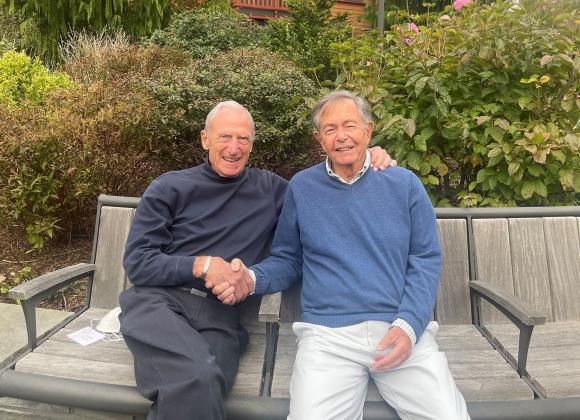
"It's Like Summer Camp"
Some of our residents compare living at NewBridge on the Charles to reliving the summer camp experiences of their youth. Two of our residents were recently featured on New Hampshire Chronicle sharing stories about how NewBridge compares to their childhood summers at Camp Alton.
Watch David and Peter's StoryPicture Yourself Here
Discover NewBridge on the Charles
Dream of a place where a luxurious lifestyle and a continuum of Harvard Medical School-affiliated care live together in harmony. Watch a video preview of our grounds, spaces, and residences.

The Life You Deserve
Find Senior Living That’s Right for You
At NewBridge on the Charles, you can enjoy a remarkable range of residence styles, floor plans, and care options to support your best life, as you define it.
Explore Our Residences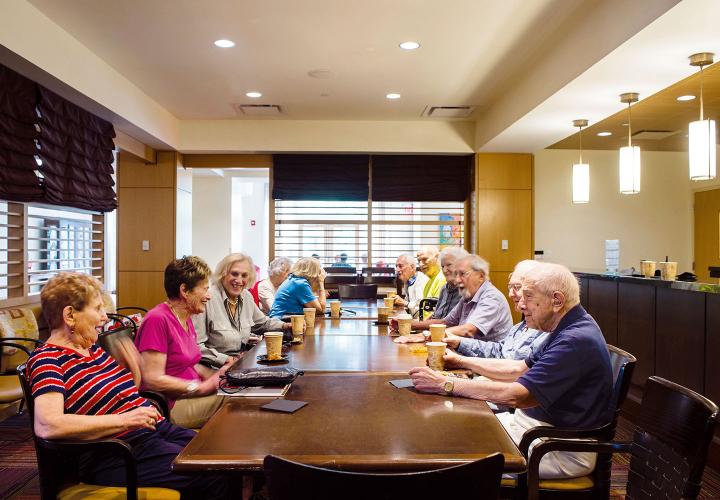
Always Something New
Explore Your Interests. Pursue Your Passions.
Each day you’ll be steps away from performances by professional musicians, visits from notable authors, and lectures by respected academics. All on the Dr. Miriam and Sheldon G. Adelson Campus, which includes an art studio, fitness center, library, and more.
Explore Community Life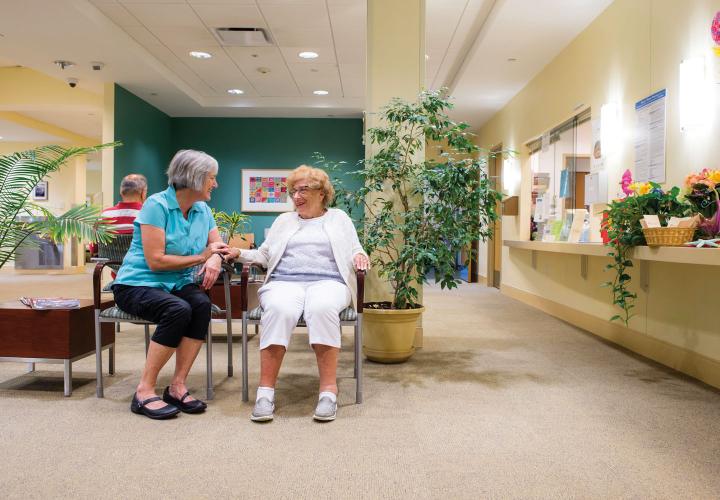
Harvard Medical School-Affiliated Care
On-Site Senior Medical Services
Access a full continuum of Harvard Medical School-affiliated health services, including a full-time primary medical practice right on site.
View Health Care ServicesSenior Living in a Premier Location
More about life at NewBridge on the CharlesWhy NewBridge on the Charles?
27+
100
1,000+
500+
From Our Blog
From Our Blog
Five Reasons Why Now is a Good Time to Move to a Senior Living Community
Is it smart to move to a retirement community?
Many adults are reluctant to consider moving to a senior living community. They may be connected to a home where they have lived for many years, built relationships with neighbors and others nearby, and perhaps raised a family. Why would...
Keep ReadingWhat People are saying about Hebrew SeniorLife
NewBridge Security and EMS Workers Earn Outstanding Team Honor
NewBridge on the Charles Security and EMS Team Honored During LeadingAge Massachusetts Annual Achievement Awards Ceremonies
LeadingAge Massachusetts honored Hebrew SeniorLife’s NewBridge on the Charles Security and EMS Team with its Outstanding Team Award, presented at the statewide LeadingAge Massachusetts Annual Achievement Awards earlier this month.
The security team is “one of the main reasons that NewBridge on the Charles is the community that it is”, said Matthew Hollingshead, executive director of NewBridge in Dedham. Team member duties include emergency medical services, fire suppression, and access control and emergency planning, but frequently extend to doing whatever it takes to help residents live their best lives. This includes the creation of package and meal delivery programs during the COVID-19 pandemic, Hollingshead said.
“This team is what makes NewBridge a cruise ship,” said Hollingshead. “Our security team takes services beyond and each individual is treated as the most important person in the community. ‘No’ is not in the team's vocabulary, and everyone chips in to make it incredible for all.”
Kim Brooks, Hebrew SeniorLife’s Chief Operating Officer for Senior Living, and Hollingshead presented the award to the members of the team who attended the event.
NewBridge Security and EMS team members are Victor Furtado, Andrew Barrett, Tom Dryer, Brian Ellison, Michael Lis, Harrison Naglin, Zach Ortega, Andrew Sousa, Daniel Turner, Joseph Bernardo, John Bernardo, Thomas Berardi, Walserson Bobo, Larry Corcoran, William Chu, Eli Feldman, Dan Flavin, Ryan Hoey, Mike Huff, Hannah Hunter, Jeff Kaplan, Carlos Lopes, Hardik Patel, Edouard Pierre-Louis, David Quirk, Mark Roche, Tom Schmitt, Hussien Shakarchi, Anthony Thai, Bob Walsh, Kristjan Zhumka, Nikolla Zhumka, Brian Hutton, William Kent, Noah Bork, and Steve Noia.
About LeadingAge
LeadingAge Massachusetts, is the only organization representing the full continuum of mission-driven, not-for-profit providers of health care, housing, and services for older persons in Massachusetts. Members of LeadingAge Massachusetts provide housing and services to more than 25,000 older persons in the Commonwealth each year. The services and settings offered by LeadingAge Massachusetts members include:
- Continuing Care Retirement Communities
- Skilled Nursing and Rehabilitation Facilities
- Residential Care Facilities
- Assisted Living Residences
- Independent, Congregate and Supportive Senior Housing
- PACE Programs
- Home Health Services
- Adult Day Health
- Transportation.
Our mission is to Expand the World of Possibilities for Aging. We strive for this by leading in innovative practices that transform how we care for our aging population, spear-heading cutting-edge initiatives to develop services that meet older adults’ needs and preferences, and advocating to advance the interests of the aging consumer.
About Hebrew SeniorLife
Hebrew SeniorLife, an affiliate of Harvard Medical School, is a national senior services leader uniquely dedicated to rethinking, researching, and redefining the possibilities of aging. Hebrew SeniorLife cares for more than 3,000 seniors a day across six campuses throughout Greater Boston. Locations include: Hebrew Rehabilitation Center-Boston and Hebrew Rehabilitation Center-NewBridge in Dedham; NewBridge on the Charles, Dedham; Orchard Cove, Canton; Simon C. Fireman Community, Randolph; Center Communities of Brookline, Brookline; and Jack Satter House, Revere. Founded in 1903, Hebrew SeniorLife also conducts influential research into aging at the Hinda and Arthur Marcus Institute for Aging Research, which has a portfolio of more than $63 million, making it the largest gerontological research facility in the U.S. in a clinical setting. It also trains more than 1,000 geriatric care providers each year. For more information about Hebrew SeniorLife, visit our website or follow us on our blog, Facebook, Instagram, Twitter, and LinkedIn.
